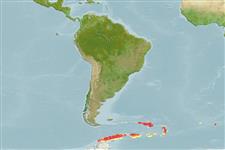Common names from other countries
Environment: milieu / climate zone / depth range / distribution range
экология
морской демерсальный; пределы глубины 5 - 770 m. Polar; 53°S - 65°S, 67°W - 4°E
Southern Ocean: in the vicinity of Bouvet Island, Scotia Sea, and northern part of the Antarctic Peninsula.
Length at first maturity / Size / Вес / Возраст
Maturity: Lm 44.9 range ? - ? cm
Max length : 72.0 cm TL самец/пол неопределен; (Ref. 4883); common length : 50.0 cm TL самец/пол неопределен; (Ref. 2805); наибольший вес (опубликованные данные): 3.7 kg (Ref. 4883)
Adults feed mostly on fish and krill. Synchronous spawner (Ref. 50743). Larvae have a long pelagic phase (Ref. 71843). Utilized as a food fish (Ref. 4931).
There is only one generation of oocytes in the ovaries indicative of determinate fecundity (Ref. 50743). Mature females may spawn for the first time from around 6-8 years of age (Ref. 71843).
Hureau, J.-C., 1985. Channichthyidae. p. 261-277. In W. Fischer and J.C. Hureau (eds.) FAO species identification sheets for fishery purposes. Southern Ocean (Fishing areas 48, 58 and 88). Rome. Vol. 2. (Ref. 2805)
Статус Красного Списка МСОП (Ref. 130435)
CITES (Ref. 128078)
Not Evaluated
Угроза для людей
Harmless
Использование человеком
рыболовство: не имеет хозяйственного значения
дополнительная информация
инструменты
Специальные отчеты
Скачать в формате XML
ресурсы в Интернет
Estimates based on models
Preferred temperature (Ref.
115969): -1.3 - 1.6, mean 0 (based on 42 cells).
Phylogenetic diversity index (Ref.
82804): PD
50 = 1.0000 [Uniqueness, from 0.5 = low to 2.0 = high].
Bayesian length-weight: a=0.00091 (0.00077 - 0.00107), b=3.49 (3.44 - 3.54), in cm Total Length, based on LWR estimates for this species (Ref.
93245).
Trophic level (Ref.
69278): 3.4 ±0.2 se; based on diet studies.
устойчивость к внешним воздействиям (Ref.
120179): средний (среднего размера), минимальное время удвоения популяции 1.4-4.4 года (K=0.17-0.24; Fec = 7,358).
Fishing Vulnerability (Ref.
59153): Moderate to high vulnerability (54 of 100).
Climate Vulnerability (Ref.
125649): High to very high vulnerability (75 of 100).
